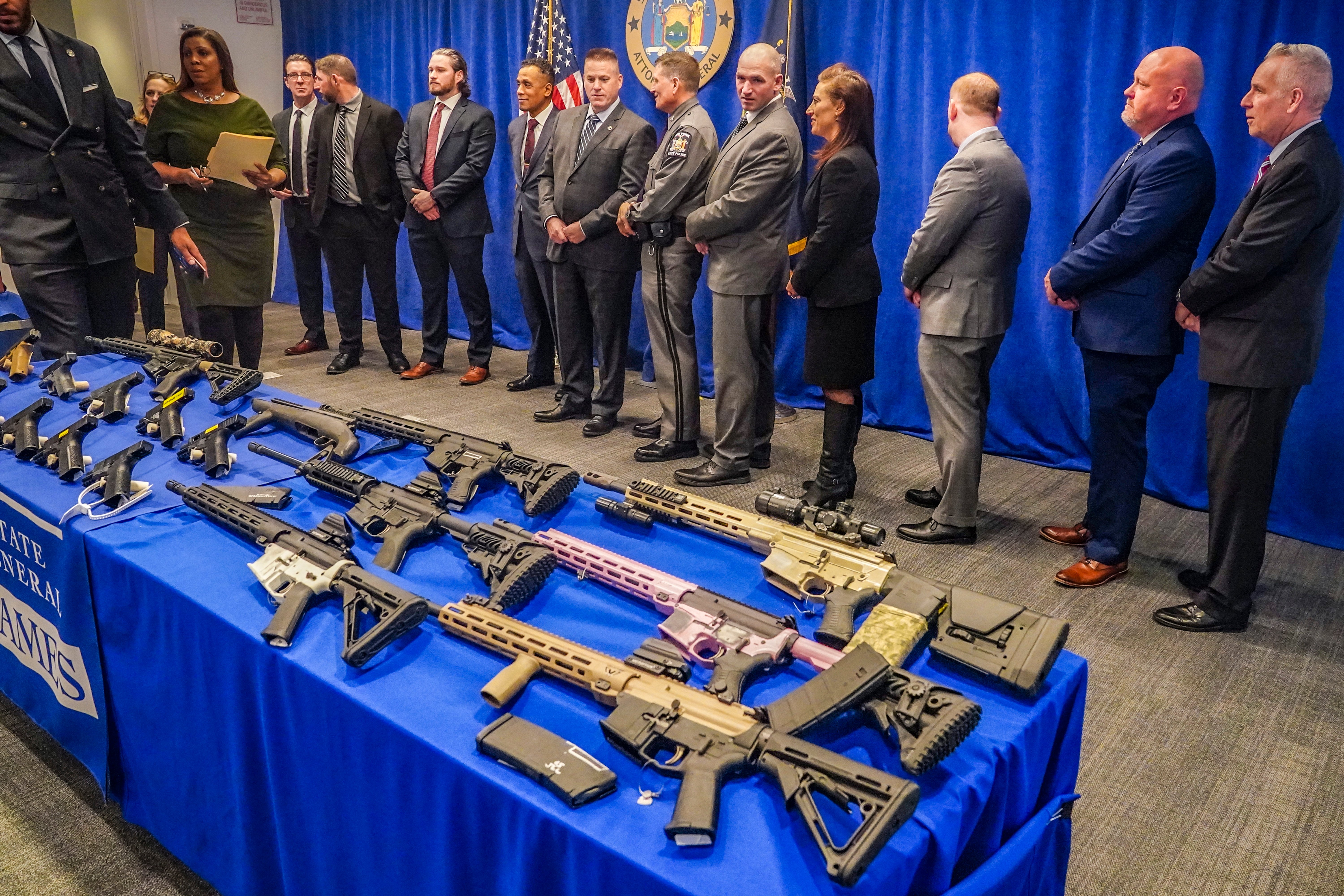Supreme Court will hear challenge to Biden administration rule on ghost guns

New York Attorney General Letitia James, second from left, arrives for a press conference with members of the New York Drug Enforcement Task Force to announce the take down of a firearm and drug trafficking operation, Wednesday March 15, 2023, in New York. (AP Photo/Bebeto Matthews)
The Supreme Court on Monday said it would weigh a challenge to a Biden administration rule on “ghost guns,” weapons made from homemade kits that can be assembled into firearms.
The administration in 2022 imposed a federal rule requiring that these kits must include serial numbers and mandating background checks for people who buy them from dealers, saying the change was needed to contend with people getting and using weapons that could not be traced by law enforcement officials. Last year, a three-judge panel of the U.S. Court of Appeals for the 5th Circuit concluded that the Biden administration had overstepped and said its rule constituted “unlawful agency action.”
Solicitor General Elizabeth B. Prelogar asked the Supreme Court to hear its appeal of the decision, saying the lower court’s conclusions were incorrect and that leaving them in place would imperil public safety. Challengers to the Biden administration’s regulation—a group that includes companies that make or sell such kits, along with a gun-rights organization—disagreed, saying the circuit court’s conclusions were correct and should be upheld.
Both the Biden administration and opponents of its rule did agree on one thing, however: They wanted the Supreme Court to take up this case and decide the issue.
This case marks the latest gun-related debate the justices have agreed to consider. In recent months, the court has heard arguments about a federal law prohibiting people under domestic-violence restraining orders from having guns and about the federal ban of bump-stock devices.
The justices have also addressed the Biden administration’s rule involving ghost guns before. Last year, the Supreme Court allowed these regulations to remain in place amid numerous challenges.
A federal judge in Texas had ruled that the Bureau of Alcohol, Tobacco, Firearms and Explosives (ATF) exceeded its authority by regulating these kits under the Gun Control Act of 1968. The Supreme Court reinstated the Biden administration’s rule last summer while other legal challenges continued around the country, then did that again weeks later following more lower court rulings.
The two sides in this case disagree on whether the kits count as firearms under the 1968 act. The Biden administration says they fall “within the plain meaning of the act’s definition of ‘firearm.’ ” Opponents say the 2022 rule “expanded the regulatory definition of ‘firearm’ beyond the Gun Control Act’s bounds.”
The 5th Circuit panel said in November that weapons parts kits are not “firearms” under the 1968 act, and the judges concluded that the ATF had acted improperly.
“Because Congress has neither authorized the expansion of firearm regulation nor permitted the criminalization of previously lawful conduct,” the panel wrote, “the proposed rule constitutes unlawful agency action, in direct contravention of the legislature’s will.”
In asking the Supreme Court to hear this case, Prelogar wrote that the 5th Circuit panel had “declared invalid key provisions of an important regulation and adopted an interpretation of the act that would effectively nullify its central provisions.”
Prelogar wrote that the panel’s decision would allow “a flood of untraceable ghost guns” nationwide, creating danger for the public and difficulties for law-enforcement officials seeking to solve crimes.
In a brief supporting Prelogar’s petition, attorneys general for more than a dozen states and Washington, D.C., defended what they called “a common-sense regulation.” They said individual states have tried to fight gun violence, but cited “a natural limit to states’ abilities to combat a nationwide problem that crosses state borders.” The federal rule, they said, helps by trying “to keep ghost guns out of the hands of violent criminals.”
Challengers to the federal rule say the Biden administration’s directive is unlawful and that ATF “overreached by effectively attempting to amend the [Gun Control Act] itself.”
The federal rule “upsets the delicate balance struck by Congress between the commercial production and sale of firearms and the noncommercial making of firearms by law-abiding citizens,” wrote the challengers.
In addition to the businesses and gun-rights group, the challengers also include two people—Jennifer VanDerStok and Michael Andren—who own items impacted by the rule and wish to buy more, according to court papers.
The challengers also note that there has been clear confusion in lower courts about the way the Biden administration rule coexists with the Gun Control Act, saying the justices needed to weigh in to help resolve this.
The case is Garland v. VanDerStok.
Write a letter to the editor, share a story tip or update, or report an error.


